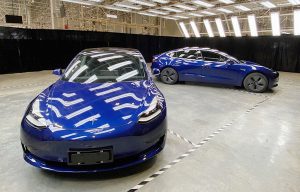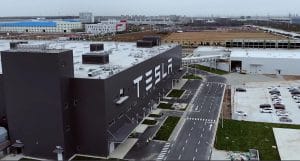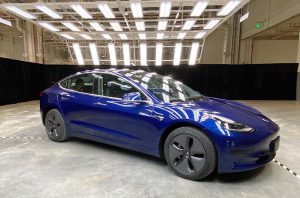
Tesla saw its registrations rise 450% from February to March as Model 3 production began ramping up.
China’s auto industry seems to be hustling toward full speed, if Tesla Inc.’s March results are any indication.
The EV maker’s registrations jumped 450% last month, compared with February’s totals, according to auto consultancy LMC Automotive. The company’s totals rose to 12,709 units in March from 2,314 in February.
However, Tesla’s good fortune hasn’t spread to the rest of the industry, although things are improving slowly. Auto sales in China fell 43.4% in March in the aftermath of the coronavirus pandemic there, but that’s an improvement when compared with the nearly 80% drop in February.
(Tesla in talks to switch to different battery for China-built Model 3 sedans.)
Tesla builds the Model 3 at its new Shanghai Gigafactory, which opened late last year. The company revealed last week it has started China sales of two more Model 3 variants built at the plant, Reuters reported.
While the company sells its entire line-up of EVs in China, it’s the Model 3 accounting for nearly all the sales, according to Moneyball, which offered up numbers for each model:
- Tesla Model 3: 11,927 (compared to 2,284 in February and 3,183 in January)
- Tesla Model X: 650
- Tesla Model S: 132
The total number of registrations in March was 12,709, compared with just 2,314 in February, which was the height of the coronavirus-related sales slump in China.
(China auto production for 2020 predicted to drop 11.5%.)
The plant is expected to be able to produce 150,000 vehicles annually, and sales numbers appear to be ramping up as the country recovers, and Tesla recovers more quickly than automakers producing gas- and diesel-powered cars and utility vehicles.
As the country’s economy cranks back up, local governments are looking to encourage people to get back to showrooms to buy new vehicles.
The central government announced that subsidies and tax breaks for new energy-efficient vehicles, NEVs, would be extended for another two years. This is a reversal of Beijing’s plans last fall to cut incentives on EVs and zero-emission vehicles, some of which were already in effect.
(China shows there may be light at the end of the pandemic tunnel for automakers.)
Other cities and provinces are also enticing consumers with cash subsidies, some as high as $1,400. Car sales declined 42% in the first quarter of 2020 compared to last year, according to data released late last week by the China Association of Automobile Manufacturers (CAAM).


